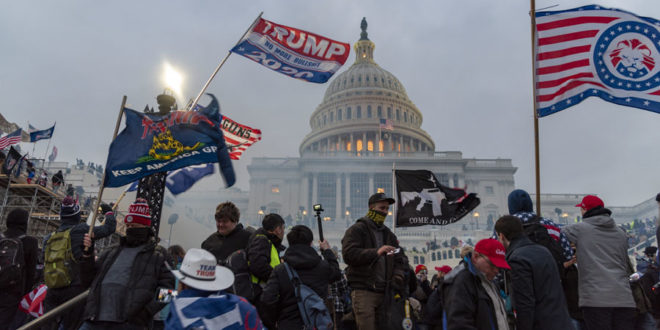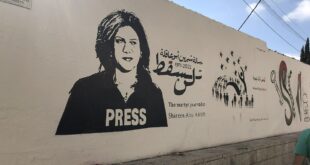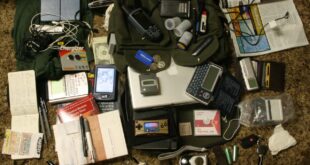For a region that has had to deal with the aftermath of decades of U.S. intervention, occupation and punishing sanctions under the banner of democracy and human rights, the live pictures of American pro-Trump rioters storming the U.S. Capitol were nothing short of astounding. Public ridicule and scorn came fast and furious.
Turkey's Hurriyet Daily News quoted local public officials as saying that the grim scenes are an unprecedented stain on the U.S. peaceful transfer of power. For most Turkish officials, reacting to the storming of the capitol entailed mimicking, nearly verbatim, previous U.S. State Department press releases on violence and unrest elsewhere in the world. Presidential Spokesperson Ibrahim Kalın wrote on Twitter: “We follow the recent developments in the U.S. capital with a lot of concern.” The Turkish foreign ministry also stated : “We call on all parties in the U.S. to maintain restraint and prudence.”
Meanwhile, Turkish President Recep Tayyip Erodgan, who has been on the receiving end of a lot of White House and Congressional criticism, accused the United States and the West in general of double standards. He said in a public statement that the scenes which unfolded on live television were “a disgrace to the history of democracy.”
In a similar rebuke, Iran’s High Council for Human Rights, said it was extremely concerned that the rights of the rioters who were detained might be violated by the capital's police and military. But Iran's Foreign Minister Mohammad Javad Zarif went a step further by criticizing four years of Trumpism on his twitter account:
Those who succumbed to Trump’s lawless bullying for 4yrs – to protect their skin at OUR people’s expense – now condemn his assault on the rule of law. But still try to use his #EconomicTerrorism against Iran as “leverage” If you can’t grow a spine, gain foresight – for your own sake.
He went on to call Trump a rogue president seeking vengeance against the American people and other nations. "What’s disturbing is that the same man has the UNCHECKED authority to start a nuclear war; a security concern for the entire int’l community,” he Tweeted.
Similarly in Iraq, which suffered 13 years of sanctions which nearly fractured the country into civil war prior to the 2003 invasion and occupation, reactions ranged from derision to vitriol. As a means to mask their anger at what has become of their country, Iraqis created memes that circulated on Facebook and Twitter showing Iraqi tanks on Pennsylvania Avenue heading to the White House to bring democracy to the American people.
In Lebanon, Hezbollah leader Hassan Nasrallah, who has borne the ire of many a U.S. politician, said the world must learn that “Trump is a killer.” “The nuclear button is at the hands of a crazy, racist, and stupid person," he said in remarks carried by Lebanese media.
In the Gulf Cooperation Council countries, traditional U.S. allies where Trump enjoys some popularity, reaction was largely muted with their embassies warning citizens to stay away from Washington, D.C. for safety reasons.
However, writing in the Arabic-language Saudi Arabian flagship newspaper ASharq Al Awsat, columnist Mamoun Fendi questioned whether the riot at the U.S. Capitol is symptomatic of a deeper malaise in the American political system. "What if the rift that afflicted the Republican Party is a reflection of a more severe/deep disease in the US economy and its political structure? And what if the symptoms of this disease appear on Democrats as well," he writes "here the equation is more complex, and the genes of the American political map need to be re-read again."
In Egypt, many were in disbelief that such violence could take place in the world's remaining superpower, with some saying the end of the Trump reign was shaking the United States at its foundations. "Is this America or what?" asked popular talk show host Amr Adib on his MBC Masr program El Hekaya (The Story). For several days, he drew parallels between Washington's criticism of Middle Eastern countries and the current "fortress" mentality that has gripped the city and some 21 other state capitals.
In his usual animated and boisterous presentation, Adib questioned how matters could have so rapidly deteriorated to the point Washington is now under police and National Guard lockdown ahead of the inauguration. Unable to mask his sarcasm, he wondered how the U.S. capital could be considered one of the most secure cities in the world. "Just a week ago it took 90 minutes for any security forces to reach the Capitol and begin evicting the pro-Trump rioters and now it's under military control? How could this have happened?" he asked.
In between his rant dipped in a good dollop of allegory and Machiavellian script-writing, however, Adib seems to have captured what many in the Middle East and Africa were thinking. What has happened to the United States?
In Tunisia, there was a more nuanced reaction that democracies should learn about the dangers of populism. Mohsen Marzouk, leader of the centrist Mashrou Tounes party, said that even "ancient democracies" are susceptible to the perils of populism. “For Tunisia, there is one single lesson: At the basis of work in public affairs there should be responsibility. Where there is irresponsibility, there is anarchy,” he was quoted as saying in Arab Weekly.
The answer to Adib's question may be far more complex than one thinks. While it remains undeniable for many around the world that America's beacon of democracy has dimmed, the answer may lie somewhere between U.S. exceptionalism boosted by a heavy dose of Trumpism and a systemic malaise and devolution of its democratic institutions.
In a discussion with Laila Al-Arian, an Arab American journalist and executive producer for the Al Jazeera documentary program Fault Lines, she stated:
The U.S. has long held itself as an example of a functioning democracy and has said that it would like to export such democracy to other places, including countries in the Middle East. Obviously, the truth is that the U.S. has long suffered from threats to its democracy, including the disenfranchisement of millions of people that live here, and continued threats to their status as equal citizens
Al-Arian believes that Middle Eastern media should report on the events within the context of the historic role of white supremacist groups in threatening democracy in their quest for maintaining power in the U.S.
In the meantime, there has also been scathing criticism by Arab and Arab-American journalists and commentators of the reporting and analysis of major U.S. networks. The latter compared the rioters to Islamist or Middle Eastern terrorists, and the storming itself to events in that region, and failed to highlight how the security forces reacted to a predominantly angry white mob.
In the fallout of the U.S. Capitol storming, a number of American media outlets compared what happened to events in other countries. Former President George W. Bush even went so far as to compare the storming of the Capitol as normal happenstance in banana republics, while former Republican presidential candidate Marco Rubio described January 6 as a "third-world style anti-American anarchy.”
Former Egyptian diplomat and opinion writer Mostafa Ahmady had a more allegorical recount of the storming of the U.S. Capitol writing that January 6 "may be considered the day when the wall of the American sense of superiority, as far as the best democratic exercises are concerned, fell." Drawing from history, he took a swipe against American journalism for not doing enough to be objective when dealing with countries outside the Western prism of what conforms to their understanding of democratic practice and what should be lambasted as autocratic and dictatorial.
The tropes paraded on major U.S. networks have left many Arab journalists incensed. In his January 14 op-ed, Ahmady said that U.S. and Western media need to apply checks and balances to end their stereotypical and partial coverage of Middle Eastern and African events. Al-Arian also took issue with how the U.S. media portrayed the events of January 6. "I think comparisons to the Middle East - and we saw and heard a number of journalists saying ‘DC looks like Baghdad or Fallujah’ - are not only inaccurate, they are offensive," she said.
Many agree with Al-Arian that the one-day violence at the U.S. Capitol cannot be compared to the conflict-ravaged nations of Iraq and Afghanistan which have for the past two decades been war zones, with tanks and Humvees, U.S. troops and checkpoints, because the U.S. occupied those countries. "This is obviously not the same thing and these comparisons trivialize the military occupations of the U.S. and reflect a lack of true understanding of what they were and how they devastated the populations that were impacted," Al-Arian added.
Writing in The National Geographic online, seasoned Beirut-based journalist Rania Abouzeid also took issue with how the drama unfolded at the U.S. Capitol and said the events in Washington on January 6 revealed America's stark double standards:
We saw the massive shows of force displayed in America’s streets against BLM protesters last summer, in clear contrast to the minimal resistance faced by armed white protesters who turned up at various state capitols over the same period. We watched news reports about Black people being shot dead for traffic violations, for looking suspicious in a hoodie, or for jogging, while some white people could storm the Capitol and have their “pain” recognized by a president who said he loves them.
"The events in the Capitol opened the Arabs appetite for sarcasm over American democracy and induced skepticism on the basis and foundations of democracy and its feasibility and usefulness in general," says Iraq-Canadian journalist Zyad Tariq Rasheed. He believes this contributed to superficial analysis of the situation in Washington: "The Arab view toward internal politics in the United States needs more in-depth investigation and more informed conclusions about the nature of the divisions that have been created among Americans due to Trump's policies."
So, is Middle Eastern scorn and ridicule justified? For some it may be, but it remains that a valuable moment may have been squandered to genuinely examine the divisiveness ripping through American society ... and learn from it.
 Arab Media & Society The Arab Media Hub
Arab Media & Society The Arab Media Hub





